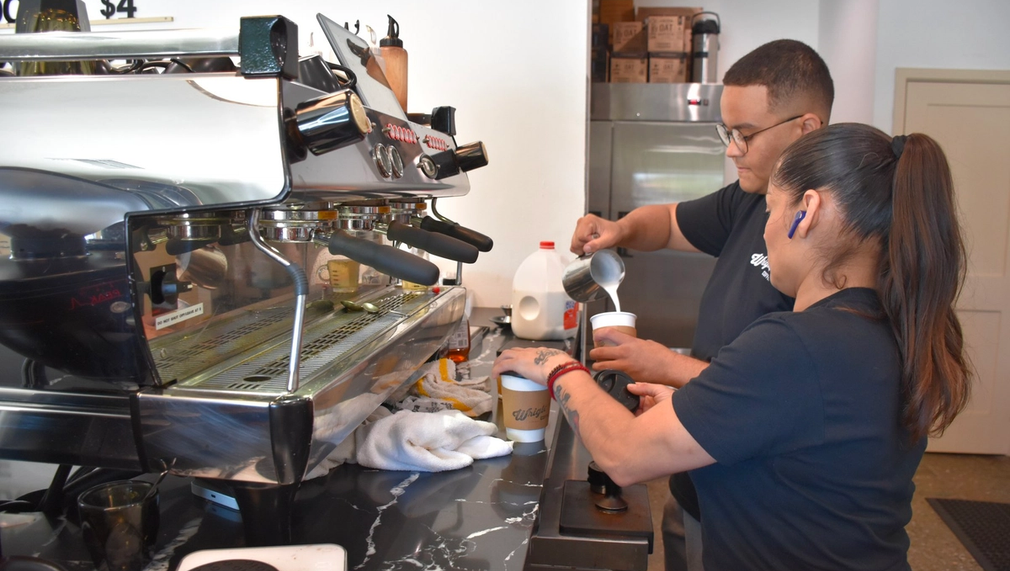Innovative Workforce Development
Through trauma-informed, high-caliber professional development and hands-on learning at Wrigley Coffee, individuals facing housing insecurity develop mindsets and skills for sustainable careers, economic mobility, and enrich their community by providing quality, specialty coffee and community space to the Wrigley neighborhood. Wrigley Coffee is a program of Family Promise of the South Bay, a nonprofit helping families achieve housing stability.

What is the primary issue area that your application will impact?
Access to Creative Industry Employment (sponsored by Snap Foundation)
In which areas of Los Angeles will you be directly working?
South LA
South Bay
In what stage of innovation is this project, program, or initiative?
Expand existing project, program, or initiative
What is your understanding of the issue that you are seeking to address?
At Wrigley Coffee, we know that parents without secure housing want nothing more than to become self-sufficient, thriving providers for their families. In order to do that they need to be able to find steady employment that, over time, can lead to a fulfilling career. The problem is most parents escaping traumatic home environments lack the practical experience and emotional management skills necessary to get and keep a job, which leaves them feeling hopeless and afraid for their future. We believe every parent deserves to have hope for a brighter future and access to employment opportunities that will provide the training, mentoring, and support necessary to allow them to take the next step towards independence. We understand how difficult it can be for people to emerge from physical and/or emotional trauma without a clear path forward, which is why we have paved the way for those in our community with quality coffee, community, and career training.
Describe the project, program, or initiative this grant will support to address the issue.
At a high level, Family Promise of the South Bay through our Wrigley Coffee program will provide career coaching and hands-on training to all of our participants so they are equipped to work and lead in the coffee and food-service industry. We also provide ongoing mentoring and networking opportunities to increase access and a sense of belonging. We do this through a process to ensure that every individual is cared for well and equipped thoroughly. First, we’ll provide transitional employment opportunities to housing insecure parents as baristas in our coffee shop. Then, they’ll receive hands-on learning from management staff and build the skills and mindsets for sustainable careers. Additionally, our participants will be partnered with an employment case manager that will provide resources, support, and expertise in identifying a suitable career path. Finally, the support team will help them move confidently into their future with access to next-level jobs that they can turn into careers.
Describe how Los Angeles County will be different if your work is successful.
Our big picture goal is to bring trauma-informed spaces to all workplaces in LA County. So many career paths are inaccessible to those that have been systemically traumatized simply due to the lack of training and understanding of trauma by managers, supervisors, and owners. Our goal is to create a model that is replicable in all businesses. By creating trauma-informed workplaces, careers that were once closed to those experiencing difficulty and trauma in their personal lives can be opened. Trauma can include housing insecurity (our focus), abuse, financial insecurity, loss of life and so much more. Our hope is to change the career landscape so that we not only have more productive workspaces but a culture that encourages growth through difficult circumstances.
What evidence do you have that this project, program, or initiative is or will be successful, and how will you define and measure success?
We have just completed our first cohort and our primary metric is the percentage of participants placed in permanent jobs after completing our program. As of today, all of our participants are on track to finding permanent employment prior to the end of the program term. Additionally, as we move forward to our next cohort, we will continue to engage with graduates to track retention in their new roles for up to 2-years. Our goal is 80% graduation and placement in the program and of those placements, 80% retention in a job after 2 years.
Approximately how many people will be impacted by this project, program, or initiative?
Direct Impact: 12
Indirect Impact: 50